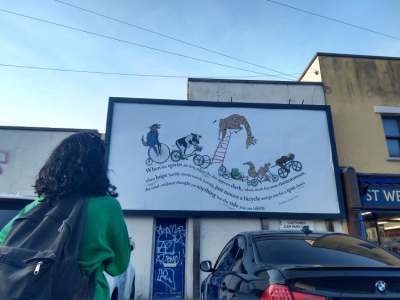Adverts have a lot to answer for.
Irresponsible food marketing denies children the right to health, as well as encouraging tonnes of food waste every year. Roadside billboards sell new cars to drivers stuck in traffic jams, while people living nearby endure lethal levels of air pollution and we all feel the heat from climate change caused by carbon emissions. Misleading advertising by fossil fuel companies promoting their ‘green’ credentials prevents us from understanding their real and dangerous impact on the environment.
And the increasing commercialisation of public spaces, with intrusive digital billboards and bus shelter advertising, turns us into passive consumers of corporate messages rather than active participants and engaged citizens.
Yet globally, we spend more money on advertising than alleviating hunger and poverty every year. In 2020, advertisers globally spent $557.3 billion, largely promoting consumption. This is 14 times the $40 billion that the UN said was needed in 2020 in global humanitarian assistance (while the actual amount given was far less than this, at $30.9 billion).
How can we begin to address such a colossal imbalance?
The problem with advertising
Advertising exists to make us buy something - often something we don’t need. Big brand adverts - especially the kind we see all around our cities on huge unavoidable billboards and digital screens - appeal to our insecurities, our need to fit in and be accepted, to persuade us that this new car, that fizzy drink or those new trainers will make us happy, fulfilled and worthy.
By making us feel inadequate and encouraging us to seek fulfilment through spending - which will only ever be short lived - advertising makes us unhappy.
In fact it depends on our unhappiness so that we remain the ideal consumers, always needing another retail fix to achieve that impossible billboard-perfect lifestyle. Research shows that people with more materialistic values are less satisfied, less energetic and more anxious.
Contemporary advertising is not concerned with giving us information about a product so that we can make an informed, conscious decision.
Advertising is designed to manipulate us at a subconscious level, playing on our desires and creating an emotional link with a product.
With the deeply concerning practice of neuromarketing, brands like McDonald’s, Pepsi and Kraft are going further, employing neuroscience techniques that use brain imaging to identify unconscious states that influence consumer behaviour. By measuring responses to marketing in the unconscious mind, advertisers can adjust their campaigns to trigger responses, leading us to make impulsive decisions.
In the case of billboards, especially the increasing number of huge digital advertising screens in our cities, this advertising is simply impossible to ignore. Not only are we unable to stop looking at the adverts, we are also unable to avoid being influenced by them.
Research shows that we don’t even have to be paying attention to an advert in order to be influenced by it.
Far from helping us make choices, corporate advertising is actually removing our freedom of choice, as well as undermining our wellbeing.







